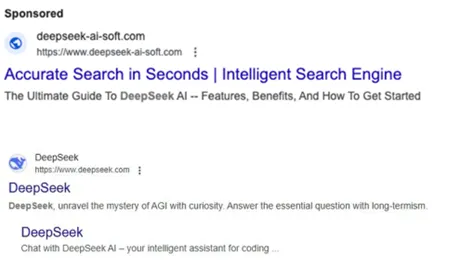
The soaring popularity of DeepSeek, amplified by ongoing debates around privacy, has not only drawn the attention of users but also piqued the interest of cybercriminals. Fraudulent advertisements, cunningly disguised as official Google search results, have begun circulating online with the intent to distribute malware. These malicious actors prey on users who casually input queries and indiscriminately click on top-listed links.
According to research by Malwarebytes, fake advertisements masquerading as DeepSeek listings have been actively promoted through Google Ads. At a glance, these counterfeit results are nearly indistinguishable from genuine ones—especially to the untrained eye. A single click is enough to redirect a user to a deceptive website meticulously designed to mimic DeepSeek’s official interface.
One such imitation site mirrors the authentic appearance of DeepSeek, yet instead initiates the download of a trojan crafted in Microsoft Intermediate Language (MSIL). This malicious code activates as soon as the unsuspecting victim attempts to install the faux “search engine.”
Criminals are banking on the public’s trust in sponsored Google results. The platform allows these ads to occupy top positions, often ranking above legitimate brand websites. This makes the deceit especially potent. The attackers are reportedly investing significant sums into ad placements, indicating both the profitability and effectiveness of their scheme.
Notably, one of the fraudulent sites listed the advertiser’s name in Hebrew — תמיר כץ — a subtle red flag that could easily go unnoticed, particularly by users unfamiliar with the expected branding of DeepSeek’s official communications.
To guard against infection, cybersecurity experts advise users to avoid clicking on sponsored links altogether. Instead, they recommend tapping the three-dot icon beside a search result URL to reveal the advertiser’s identity. If the name appears suspicious or unfamiliar, it is wiser to rely on organic search results.
For those seeking full protection, installing an ad blocker can eliminate all sponsored links entirely, reducing the chance of an inadvertent visit to a malicious site. In an environment where Google cannot guarantee the integrity of its advertising ecosystem, such defensive measures have become increasingly imperative.


